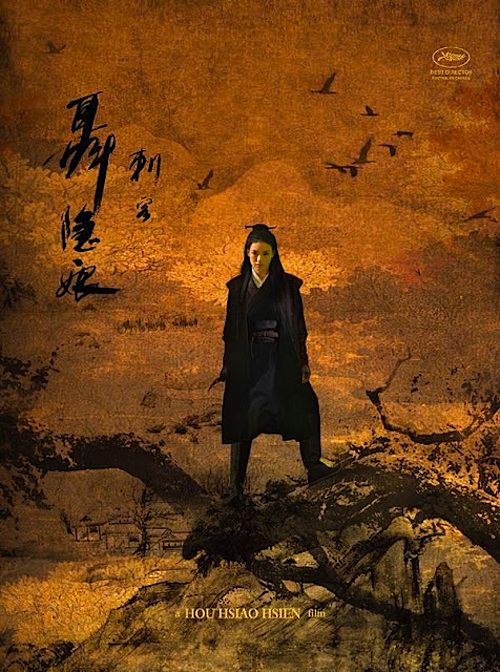By Joe Bendel. The cinematic tradition of the butt-kicking woman wuxia warrior can be traced directly to Red Heroine from 1929. It might date back even further, but sadly few Chinese silent films survived Mao’s many destructive mass campaigns. In the succeeding years, Michelle Yeoh and Cheng Pei-pei made their legendary careers playing such characters. However, they never had the sort of exquisitely lush backdrops afforded to Nie Yinniang, the titular anti-heroine of Hou Hsiao-hsien’s long-anticipated first wuxia film (and Taiwan’s official Academy submission), The Assassin, which screened as a Main Slate selection of the 53rd New York Film Festival.
As child, Nie Yinniang was promised in marriage to her cousin Tian Ji’an but scandal tore those plans asunder. After an ill-fated episode trespassing in a rival family’s palace, Nie is trundled off to Jiaxin, a martial arts nun, who trains her to be the perfect assassin. At twenty-three, her education is complete, but she still shows traces of a conscience. After sparing her most recent target out of sympathy for his young son, Nie is sent home, ostensibly to visit her parents. However, her next assignment will be the very same Tian Ji’an, who is now the headstrong military governor of Hebei Province.
To further complicate matters, Tian Ji’an is openly plotting against Tian Xing, one of his military commanders, who also happens to be a distant relative. Nie Yinniang might just be inclined to intercede on Tian Xing’s behalf, but that is decidedly not what Jiaxin had in mind.
Frankly, Hou’s narrative (also credited to three co-screenwriters) is rather murky and elliptical. Wuxia fans simply have to be content knowing some kind of intrigue is going on, even if the who’s and why’s are a tad tricky to follow. Instead, this is a film meant to wash over viewers. Even at the deliberately confined Academy ratio, The Assassin is a staggering sight, often resembling traditional Chinese watercolor scrolls, with one lone figure (usually Nie) tucked away in the corner of a sprawling landscape. Mark Lee Ping-bin has been one of the best cinematographers not named Christopher Doyle for years, but The Assassin is his finest work yet. Not to belabor the point, but the film is gorgeous.
 Having Shu Qi as the lead does not hurt either. In fact, the film would not have worked without her. As a standout in previous Hou films (remember the opening tunnel scene in Millennium Mambo), she can withstand his close scrutiny, quietly projecting a host of emotions with power and economy. Yet, she also has legit action chops forged in films like Journey to the West. In contrast, Chang Cheng looks ill at ease as Tian Ji’an, even though he certainly knows his way around a wuxia film. However, as Jiaxin, Sheu Fang-yi (also excellent as a very different teacher in Touch of the Light) is a wonderfully ambiguous antagonist and a fitting equal to Shu Qi’s Nie.
Having Shu Qi as the lead does not hurt either. In fact, the film would not have worked without her. As a standout in previous Hou films (remember the opening tunnel scene in Millennium Mambo), she can withstand his close scrutiny, quietly projecting a host of emotions with power and economy. Yet, she also has legit action chops forged in films like Journey to the West. In contrast, Chang Cheng looks ill at ease as Tian Ji’an, even though he certainly knows his way around a wuxia film. However, as Jiaxin, Sheu Fang-yi (also excellent as a very different teacher in Touch of the Light) is a wonderfully ambiguous antagonist and a fitting equal to Shu Qi’s Nie.
Martial arts fans might well be put off by Hou’s approach to the fight scenes. For the most part they are executed spectacularly quickly, but that is how an assassin like Nie Yinniang would want to take care of business. It will likely prove divisive among genre diehards, but it is worth experiencing just to see how Hou’s aesthetic translates in a wuxia setting. Recommended for its remarkably accomplished artistry and what may very well prove to be an iconic turn from Shu Qi, The Assassin screened this past weekend at the Walter Reade, as part of this year’s NYFF, in advance of its October 16th New York opening at the IFC Center and the Elinor Bunin Munroe Film Center.
LFM GRADE: A-
Posted on October 12th, 2015 at 12:55pm.